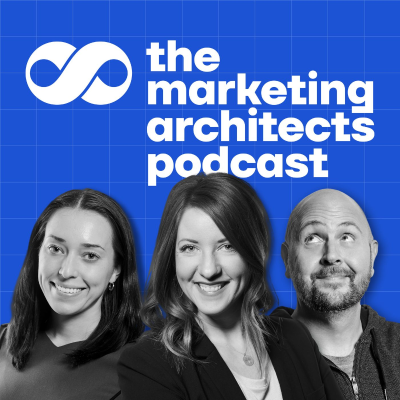
The Marketing Architects
Podcast af Marketing Architects
Introducing a research-first podcast that builds revenue, not condos.Answer questions on the biggest marketing trends and news with discussions based in marketing, psychology and economics research. Along the way, learn about marketing accountability, category leadership, brand-building and much more.Featuring a team of experienced marketers whose blueprints for success are marketing strategies actually proven to work.
Prøv gratis i 3 dage
99,00 kr. / måned efter prøveperiode.Ingen binding.
Alle episoder
174 episoderWelcome to Nerd Alert, a series of special episodes bridging the gap between marketing academia and practitioners. We’re breaking down highly involved, complex research into plain language and takeaways any marketer can use. In this episode, Elena and Rob explore the paradox between consumers' stated privacy concerns and their willingness to share data for small incentives, revealing how privacy regulations affect the entire advertising ecosystem. Topics covered: * [01:00] "Privacy and Consumer Empowerment in Online Advertising" * [02:00] GDPR's impact on ad platforms and consumer behavior * [04:00] How data sharing affects product pricing * [05:00] The privacy paradox explained * [07:00] New privacy-friendly ad models * [10:00] Balancing personalization with cultural imprinting To learn more, visit marketingarchitects.com/podcast or subscribe to our newsletter at marketingarchitects.com/newsletter. Resources: Choi, W. J., & Jerath, K. (2021). Privacy and Consumer Empowerment in Online Advertising. Forthcoming in Foundations and Trends in Marketing. Available at SSRN: https://ssrn.com/abstract=4017940 [https://ssrn.com/abstract=4017940] Get more research-backed marketing strategies by subscribing to The Marketing Architects on Apple Podcasts, Spotify, or wherever you listen to podcasts.
The most efficient frequency for TV advertising is just one impression. As controversial as that sounds, the data is clear. You need at least 2X more conversion likelihood from a second viewing to justify its cost. This week, Elena, Angela, and Rob are joined by Jordan Rossler, VP of Media Analytics, to explore why cost is the principal determinant of TV's ROI. They examine the controversial "Everything Works at Zero" principle, where any effective media becomes dramatically more efficient when you lower its cost. The team breaks down why CPM is king and how to evaluate if cheap media is still high quality. Topics covered: * [01:00] The "Everything Works at Zero" principle explained * [05:45] How TV pricing differs between linear and streaming * [12:00] Why frequency of one is the most efficient level for TV * [14:00] Creating ads that stand alone regardless of frequency * [16:30] The hidden costs of targeting in TV advertising * [19:00] Using ACR data to prove cost-efficient buys outperform premium ones * [23:45] Debunking myths about targeting effectiveness To learn more, visit marketingarchitects.com/podcast [https://www.marketingarchitects.com/Podcast] or subscribe to our newsletter at marketingarchitects.com/newsletter [https://www.marketingarchitects.com/Newsletter]. Resources: Reach, Revenue & ROI: The 3 Principles for Effective Advertising Report: https://www.marketingarchitects.com/blog/report-three-principles-for-effective-tv-advertising [https://www.marketingarchitects.com/blog/report-three-principles-for-effective-tv-advertising] Get more research-backed marketing strategies by subscribing to The Marketing Architects on Apple Podcasts, Spotify, or wherever you listen to podcasts.
Welcome to Nerd Alert, a series of special episodes bridging the gap between marketing academia and practitioners. We’re breaking down highly involved, complex research into plain language and takeaways any marketer can use. In this episode, Elena and Rob explore how platform design influences marketing outcomes, revealing that each digital ecosystem creates unique challenges and opportunities that impact advertising effectiveness. Topics covered: * [01:00] "Platform Research in Marketing" * [04:00] How network effects shape platform economics * [05:10] The interaction between organic and paid content * [06:45] The impact of reviews and platform manipulation * [07:15] Self-preferencing and the ethics of content labeling * [09:30] Platform-specific insights for marketers To learn more, visit marketingarchitects.com/podcast or subscribe to our newsletter at marketingarchitects.com/newsletter. Resources: Sen, A., Lambrecht, A., & Newby, J. (2025). Platform Research in Marketing. Carnegie Mellon University and London Business School. Get more research-backed marketing strategies by subscribing to The Marketing Architects on Apple Podcasts, Spotify, or wherever you listen to podcasts.
Think of brand as a turbocharger for your paid ads. It warms people up before they meet your call to action or come into market. But when is the right time to start investing in brand building over pure performance marketing, especially as a digital-first company? This week, Elena, Angela, and Rob explore when performance marketing reaches diminishing returns and why it's so difficult for marketers to shift budget toward brand. Plus, they share real client examples of how brand investment transformed businesses, including Old Spice's reinvention that increased sales 125% in just three months, and outline metrics beyond traditional brand studies that prove brand's impact on your business. Topics covered: * [01:00] Research on brand equity's impact on ecommerce * [03:30] Signs your performance marketing is reaching diminishing returns * [09:00] How brand acts as a turbocharger for paid advertising * [15:00] Client success stories from brand investment * [20:00] Old Spice's brand reinvention that increased sales 125% * [28:00] Better ways to measure brand impact beyond brand studies To learn more, visit marketingarchitects.com/podcast [https://www.marketingarchitects.com/podcast] or subscribe to our newsletter at marketingarchitects.com/newsletter [https://www.marketingarchitects.com/newsletter]. Resources: Mokha, Anupreet. (2021). Brand Equity, Brand Satisfaction, and Brand Loyalty: A Study of Select E-Commerce Industry. International Journal of Online Marketing. 11. 34-50. 10.4018/IJOM.2021070103. Get more research-backed marketing strategies by subscribing to The Marketing Architects on Apple Podcasts, Spotify, or wherever you listen to podcasts.
Welcome to Nerd Alert, a series of special episodes bridging the gap between marketing academia and practitioners. We’re breaking down highly involved, complex research into plain language and takeaways any marketer can use. In this episode, Elena and Rob explore how Bayesian modeling offers a more nuanced approach to marketing attribution than traditional methods. They discuss why many marketers still rely on oversimplified attribution models despite their limitations. Topics covered: * [01:00] "Bayesian Modeling of Marketing Attribution" * [03:00] Problems with traditional attribution models * [04:50] Why simple models persist despite their flaws * [06:00] Key components of Bayesian attribution * [08:00] Rapid decay of ad effects and negative interaction effects * [09:45] How this approach can offer deeper marketing insights To learn more, visit marketingarchitects.com/podcast or subscribe to our newsletter at marketingarchitects.com/newsletter. Resources: Sinha, R., Arbour, D., & Puli, A. (2022). Bayesian Modeling of Marketing Attribution. Available at arXiv:2205.15965 [https://arxiv.org/abs/2205.15965] Get more research-backed marketing strategies by subscribing to The Marketing Architects on Apple Podcasts, Spotify, or wherever you listen to podcasts.
Prøv gratis i 3 dage
99,00 kr. / måned efter prøveperiode.Ingen binding.
Eksklusive podcasts
Uden reklamer
Gratis podcasts
Lydbøger
20 timer / måned



















